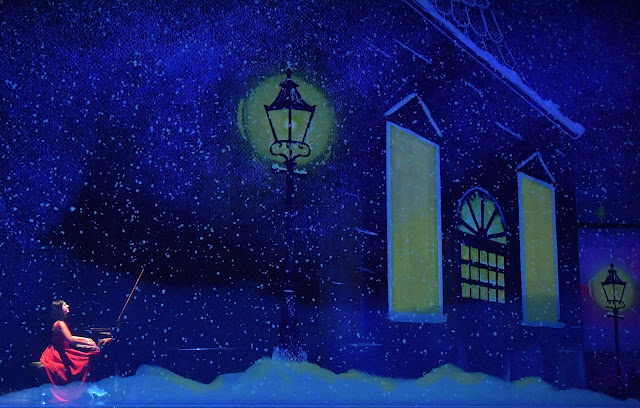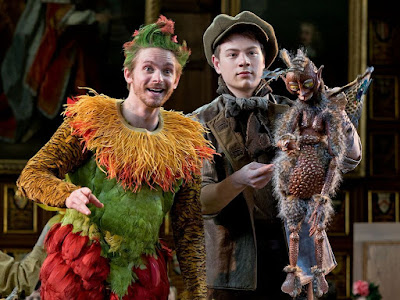 |
Vincent Ebrahim as Dara
credit Ellie Kurttz |
Tanya Ronder/Shahid Nadeem Dara; Zubin Varla, Vincent Ebrahim, Sargon Yelda, dir: Nadia Fall; Royal National Theatre
Reviewed by Robert Hugill
on Mar 28 2015
Star rating: 4.0
Visual spectacle, and religious strife; an Indian historical epic brought to life
On Saturday night (28 March 2015) we had one of our occasional forays into non-musical theatre to see Tanya Ronder's adaptation of Shahid Nadeem's play Dara at the Royal National Theatre, directed by Nadia Fall. I have to confess that our reasons for going were many and varied, an interest in the history of the period (the era when the Mogul Emperor Shah Jahan built the Taj Mahal), the continuing importance of the subject matter (struggle between two branches of Islam as embodied by Shah Jahan's sons Dara and Aurangzeb) and the stunning designs (by Katrina Lindsay) based on Mogul miniatures, not to mention the plethora of magnificent beards.
 |
Sargaon Yelda as Aurangzeb
photo credit Ellie Kurttz |
The whole look of the play was indeed stunning, not just Lindsay's superb costumes but that when the cast stood they looked like the originals. Both Sargon Yelda as Aurangzeb and Zubin Varla as Dara stood in poses which even seemed to emulate the posture of those depicted in miniatures.
The play is based on an original by Shahid Nadeem, premiered in Pakistan by the
Ajoka Theatre. But whereas Ajoka Theatre's production evidently used narrative and lots of song and dance to tell the story, Tanya Ronder and director Nadia Fall had transformed it into a neo-Shakespearean epic embodied by the stunning trial scene at the end of the first part, when Dara is put on trial for apostasy by a Sharia court. I have to confess that I wanted more of this religious debate, but I am aware that not everyone has my appetite for religious debate.
 |
Scott Karim as Faqir
credit Ellie Kurttz |
The show was billed as lasting two hours 40 minutes (or two hours 50 minutes) but in fact it last two hours 30 minutes which made me wonder whether it had been trimmed. For me it was still too long, and Ronder's fascination with intercutting scenes past and present led to a rather patchwork of short scenes which took a long time (the first 45 minutes) to settle into a clear narrative.
The performances were superb and both Zubin Varla as Dara and Sargon Yelda as Aurangzeb were strong and contrasting. In fact their stage time together was limited but the emotional charge between them was such that you wanted more. Vincent Ebrahim was similarly strong as Shah Jahan, with Nathalie Armin and Anneika Rose providing strong support as his daughters Roshanara and Jahanara (conveniently for the plot, one supporting each brother), and Chook Sibtain as Itbar the imperial eunuch who has the grisly duty of delivering Dara's severed head to his father.
It was a large cast, many playing multiple roles, with 22 cast members listed in the biographies in the programme book. Perhaps there were slightly too many roles, and some short scenes seemed a little redundant and not everyone had the power to take the stage if their scene was a bit weak dramatically. But overall this a very strong ensemble cast.
 |
Trial scene - Vincent Ebrahim as Dara
& Prasanna Puwanarajah as Prosecutor Talib
and the company of Dara credit Ellie Kurttz |
It was heartening to see virtually an entire cast of actors of Indian, Pakistani and similar heritage, and it is rather shaming that given the wealth of talent, such things do not happen more often. Given the Shakespearean historical epic nature of the play, it seemed a shame that the opportunity hadn't been taken to make this even more of a project, and perform a Shakespearean play with the same cast, running alongside
Dara.
Though three live musicians (Nawazish Khan, Kaviraj Sing Dhadyalla, Vikaash Sankadecha) were involved in the production music did not play that much of a role, often acting as little more than a backdrop or as entractes between scenes. There was one spectacular moment at Faqir, the sufi master's house at the start of part two when music and dance seemed to form a central part of the production and I could have wished for more.
It wasn't just the casting which was significant, the audience too seemed to be from a rather different demographic than usual, and the theatre was full. So no matter how we critics chunter about details, there was much to celebrate in a fascinating and ultimately gripping evening.
Elsewhere on this blog:




































.jpg)

.jpeg)





.jpeg)